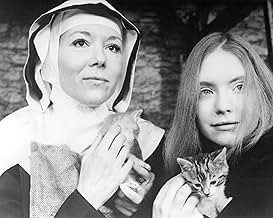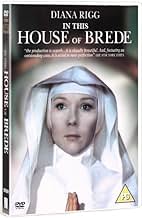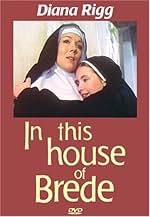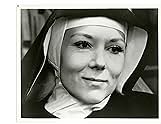A well-to-do London businesswoman gives up her comfortable life, including the man who loves her, to become a cloistered Benedictine nun.A well-to-do London businesswoman gives up her comfortable life, including the man who loves her, to become a cloistered Benedictine nun.A well-to-do London businesswoman gives up her comfortable life, including the man who loves her, to become a cloistered Benedictine nun.
- Nominated for 1 Primetime Emmy
- 1 nomination total
Fanny Rowe
- Miss Bowman
- (as Frances Rowe)
Dearbhla Molloy
- Dame Beatrice
- (as Dervla Molloy)
Yasuko Nagazumi
- Mariko
- (as Yasuko Magazumi)
- Director
- Writers
- All cast & crew
- Production, box office & more at IMDbPro
Featured reviews
I certainly can appreciate the previous review by the person who very capably compares the book to the movie. But I had not read the book when I first saw the movie years ago on the late show, and I still have not read it. What I have done is stop to watch the movie again and again every time I see that it is coming on. Freed from comparison, the movie is lovely. I have never felt the movie gives a good enough sense of the depth of emotion it seems (to me, at least) would be necessary to impel the main character to make the decision she makes to enter the convent; nonetheless, once the viewer accepts the fact of that decision, the rest of the movie is delightful. Rigg plays her role with clarity, thoughtfulness, circumspection, and elegance. The slow resolution of conflict within the cloistered community is gracefully marked. It is a masterful illustration of patience as virtue. The movie always leaves me with a sense of peace and, finally, joy, although I am not a religious person in the least. I recommend it highly.
If I had never read the novel (and loved it), and if I had never lived the cloistered religious life (which I have), I would recommend this film without reserve.
My reservations are based on the following: Having lived in a cloister for over two years, I can tell you that, even in these post-Vatican II times, a postulant or novice would never be permitted to speak freely with another sister, especially an elder, without permission from her novice mistress. Recreations are not "free time", as depicted in the film; it is a daily get-together of the community as a whole, and it is encouraged that you converse in groups of at least three (you can talk to one other sister if you feel you have to, but certainly not for the whole recreation period). Also, silence being an essential and necessary aspect of contemplative monasticism, a sister, no matter what rank, would not sing out loud whenever and wherever she felt moved to do so, and especially not during work time. I could go on... but suffice it to say that this film is not an accurate depiction of cloistered life.
However, I do have positive feelings about this film. Even though it bears little resemblance in plot to the novel, it's still a good basic story in itself and is very well acted by an ensemble of wonderful actors. And, inaccurate of the life as it is, the film still evokes in me a nostalgic longing for the monastery, and I admit that I watch it for mainly that reason.
Oh, that the BBC would produce a mini-series of Godden's wonderful novel! That would be something to see. Godden was herself a Benedictine Oblate (lay persons connected by vows to a religious order), and her book is a loving and faithful tribute to Benedictine nuns everywhere.
My reservations are based on the following: Having lived in a cloister for over two years, I can tell you that, even in these post-Vatican II times, a postulant or novice would never be permitted to speak freely with another sister, especially an elder, without permission from her novice mistress. Recreations are not "free time", as depicted in the film; it is a daily get-together of the community as a whole, and it is encouraged that you converse in groups of at least three (you can talk to one other sister if you feel you have to, but certainly not for the whole recreation period). Also, silence being an essential and necessary aspect of contemplative monasticism, a sister, no matter what rank, would not sing out loud whenever and wherever she felt moved to do so, and especially not during work time. I could go on... but suffice it to say that this film is not an accurate depiction of cloistered life.
However, I do have positive feelings about this film. Even though it bears little resemblance in plot to the novel, it's still a good basic story in itself and is very well acted by an ensemble of wonderful actors. And, inaccurate of the life as it is, the film still evokes in me a nostalgic longing for the monastery, and I admit that I watch it for mainly that reason.
Oh, that the BBC would produce a mini-series of Godden's wonderful novel! That would be something to see. Godden was herself a Benedictine Oblate (lay persons connected by vows to a religious order), and her book is a loving and faithful tribute to Benedictine nuns everywhere.
A professional organist friend of mine at a major cathedral in New York City is interesting in finding out what the organ music was in this movie. Apparently, it is played in fragments, which obviously makes determining what piece it is more difficult. Does anyone have a suggestion as to how to determine the identity of this music? The Music Director, unfortunately, has passed away. I would be grateful for any suggestions as to how to research this issue, before I write directly to BBC to attempt to follow-up. BBC have been very responsive in the past but I thought I would try this forum first. Sorry for the long-winded nature of this query - trying to get in my required ten lines of text.
Almost 20 years before being proclaimed a Dame Commander of the Order of the British Empire, Diana Rigg was portraying a dame of a very different order--that of a fully inducted member of a Benedictine abbey--in the 1975 TV film "In This House of Brede." Perhaps I should mention here that I have not read (Margaret) Rumer Godden's 1969 source novel, and can only comment on the film that I have seen. Many of my fellow reviewers here seem to feel that this televised version cannot hold a vestal candle to its original source, and that does not surprise me; isn't the book always fuller, richer, deeper? Still, what HAS been put on screen still offers much. Here, Diana plays Philippa Talbot, a British businesswoman who has suffered some genuine tragedies in her life and who finds her current lot empty and meaningless. Thus, her application to Brede, where we follow her, over the course of nine years, as she progresses from postulant to novice to junior to dame. Her life at Brede is made complicated by the jealousy and mistrust of elderly Sister Agnes, by the arrival of a group of Japanese girls whom she must instruct, and most especially by the advent of Joanna, a young postulant (well played by Judi Bowker) who arouses Philippa's maternal instincts. Although all the actresses on display here are quite good, it is Diana Rigg, naturally, who takes top honors. How exceptional she is, especially in her emotionally conflicted scenes with Joanna, in her final moments with Agnes, and in her touching scenes with (head Mother) Catherine (again, nicely played by Gwen Watford). Dame Philippa is about as different a role as can be imagined from a certain supersexy secret agent that Rigg had popularized eight years earlier, and to the actress' great credit, she makes a very convincing job of it. Only...just one question from this Jewish reviewer: Do all cloistered nuns wear so much freakin' lipstick?!?
How well I remember this film! I was fifteen years of age and I had read the book. I was attending St Mary's Abbey Grammar School in Mill Hill in Londond when our headmistress gave us the exciting news that a film was to be made in the school. Since it was an all girls school there was as much excitement in the electricians, floor crew, best boys and males in general as there was in the presence of Diana Rigg. To her credit she was very kind to a bunch of tongue-tied schoolgirls and made no objection to our sitting in and watching two of the scenes being shot. I'm not sure if my memory serves me correctly but as far as I recall it was our Sister Maureen who sang for Judy Bowker when she was taking her vows. I doubt we learned much during that time, there were way too many distractions. I saw the film once, many years ago but I really must make an effort to watch it again.
Did you know
- TriviaDiana Rigg, Dennis Quilley and Nicholas Clay also appeared together in "Evil Under the Sun"
- ConnectionsFeatured in The 27th Annual Primetime Emmy Awards (1975)
Details
Contribute to this page
Suggest an edit or add missing content































